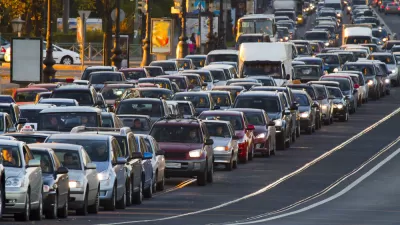The University of Michigan Transportation Research Institute released its eighth report on peak motorization in the U.S., an evaluation of time spent traveling for a broad category of purposes, not just work. From 2004 to 2014, total time decreased.

If you were to take at face value the August 26 Urban Mobility Scorecard prepared by the Texas A&M Transportation Institute (TTI) and INRIX, you'd believe that congestion is worsening throughout the United States, and a good reason to lay more asphalt. Of course, as Planetizen blogger Todd Litman explains here and here, that's hardly the case.
The supposed congestion plaguing American cities also belies the findings of the "Peak Motorization" report from the University of Michigan Transportation Research Institute (UMTRI) released September 1. This report evaluated how much time we spent traveling.
Researcher Michael Sivak evaluates two years only: 2004, the year he previously determined had the highest vehicle miles traveled per capita [PDF], and 2014, the latest year for which data is available from the American Time Use Survey prepared by the Bureau of Labor Statistics—"a representative nationwide survey of how, where, and with whom Americans spend their time."
The tables report trip times for ten categories of trips—for eating, education, work, etc., far different than the one category evaluated by TTI. From the report:
Activities for which average travel time decreased included eating and drinking (from 0.13 hours to 0.10 hours), purchasing goods and services (from 0.30 hours to 0.27 hours), caring for and helping nonhousehold members (from 0.08 hours to 0.05 hours), work (from 0.28 hours to 0.27 hours), education (from 0.04 hours to 0.03 hours), and leisure and sports (from 0.23 hours to 0.21 hours). (These values are for men and women combined.)
"The main implications of the present results are that the total travel time per person decreased substantially from 2004 to 2014," Sivak concludes. However, he adds, "that this decrease is due to a decrease in the proportion of persons engaged in the trips, and not an overall reduction of the duration of the trips."
Click here for a complete list of publications from UMTRI's Sustainable Worldwide Transportation.
FULL STORY: "Has motorization in the U.S. peaked? Part 8: Travel times in 2004 and 2014" [PDF]

Alabama: Trump Terminates Settlements for Black Communities Harmed By Raw Sewage
Trump deemed the landmark civil rights agreement “illegal DEI and environmental justice policy.”

Study: Maui’s Plan to Convert Vacation Rentals to Long-Term Housing Could Cause Nearly $1 Billion Economic Loss
The plan would reduce visitor accommodation by 25% resulting in 1,900 jobs lost.

Planetizen Federal Action Tracker
A weekly monitor of how Trump’s orders and actions are impacting planners and planning in America.

Wind Energy on the Rise Despite Federal Policy Reversal
The Trump administration is revoking federal support for renewable energy, but demand for new projects continues unabated.

Passengers Flock to Caltrain After Electrification
The new electric trains are running faster and more reliably, leading to strong ridership growth on the Bay Area rail system.

Texas Churches Rally Behind ‘Yes in God’s Back Yard’ Legislation
Religious leaders want the state to reduce zoning regulations to streamline leasing church-owned land to housing developers.
Urban Design for Planners 1: Software Tools
This six-course series explores essential urban design concepts using open source software and equips planners with the tools they need to participate fully in the urban design process.
Planning for Universal Design
Learn the tools for implementing Universal Design in planning regulations.
Caltrans
Smith Gee Studio
Institute for Housing and Urban Development Studies (IHS)
City of Grandview
Harvard GSD Executive Education
Toledo-Lucas County Plan Commissions
Salt Lake City
NYU Wagner Graduate School of Public Service



























